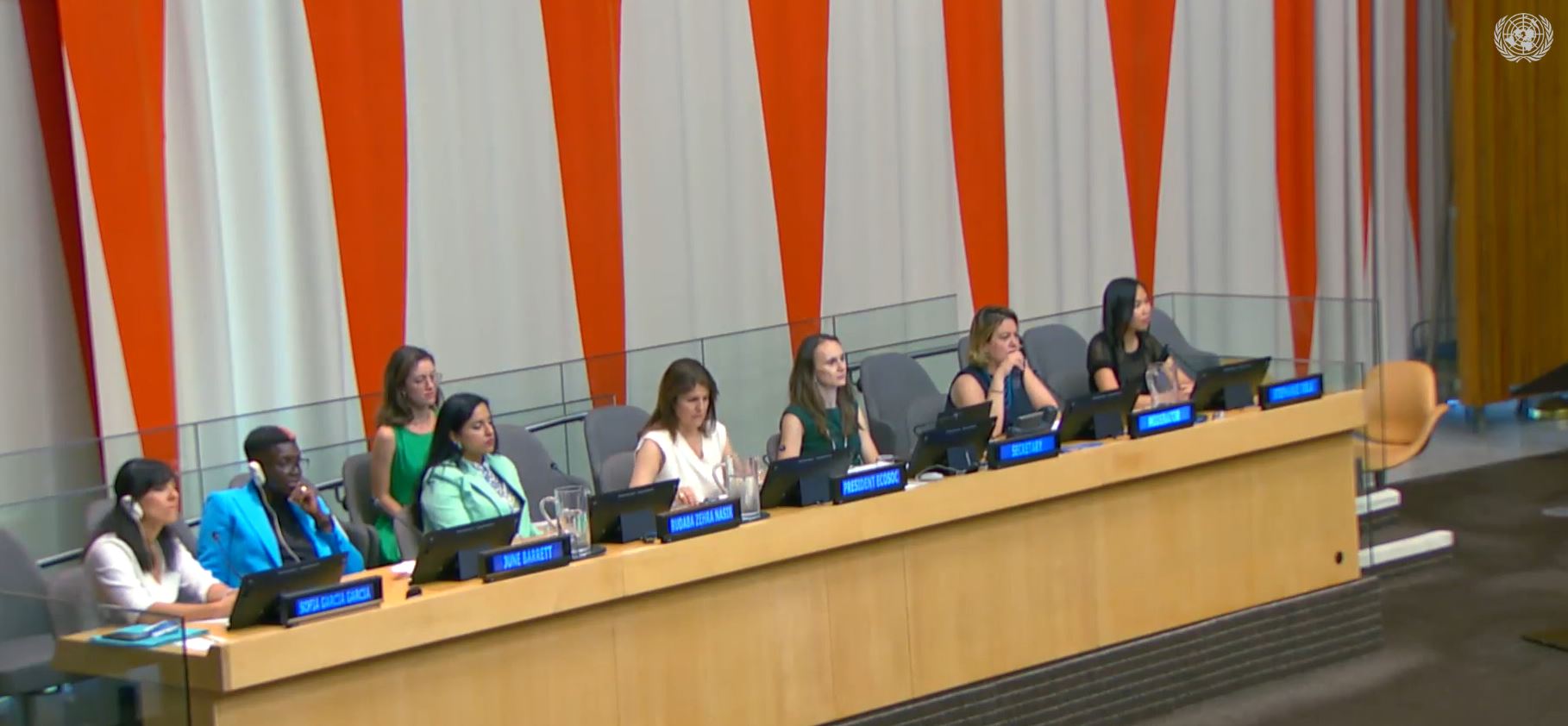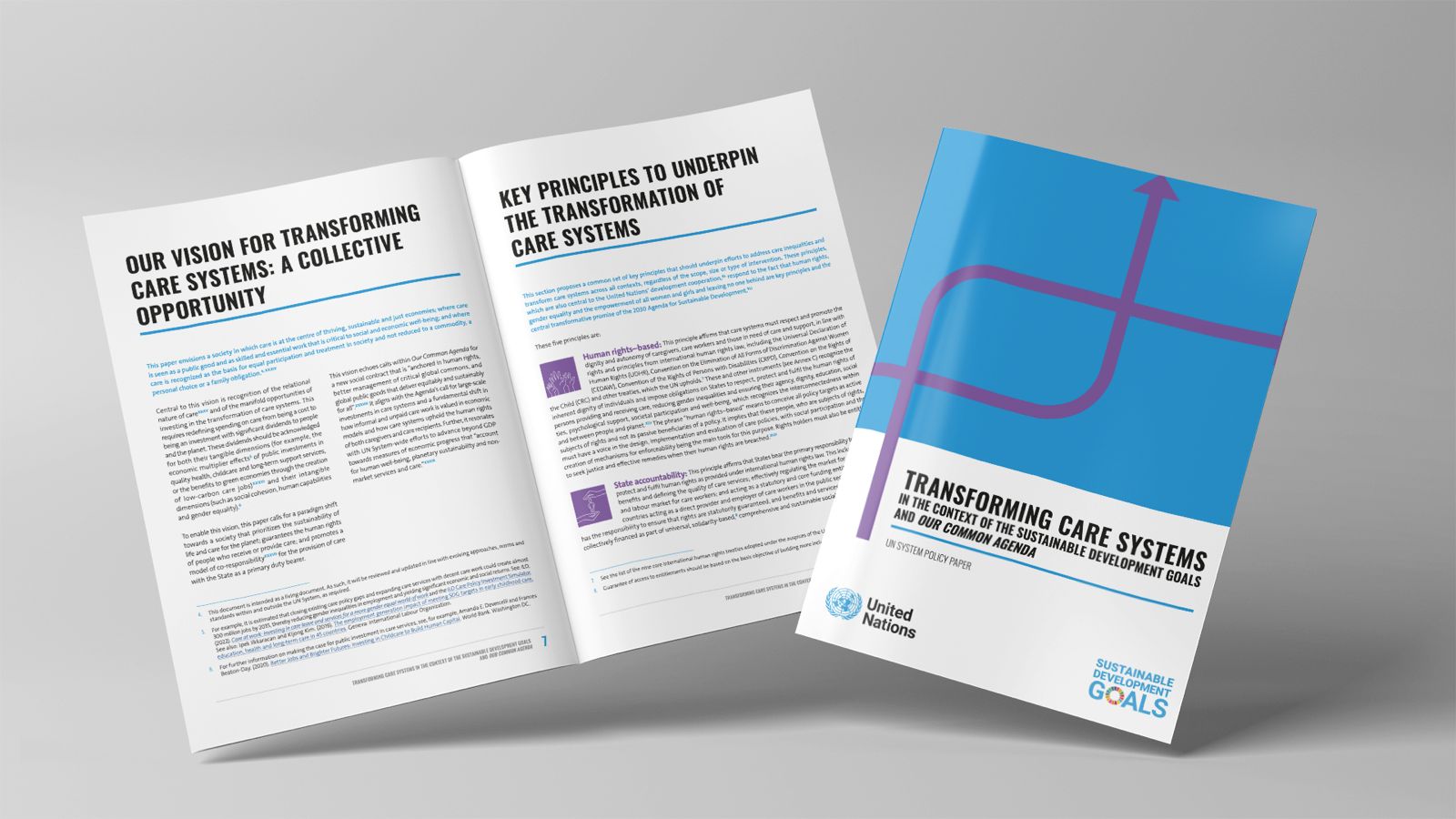ECLAC participated in the development of the first document prepared by the United Nations system to amplify the promotion of comprehensive care systems
Work area(s)
Topic(s)
In the framework of the Special Meeting of the Economic and Social Council on Care and Support Systems, the document "Transforming Care Systems in the Context of the Sustainable Development Goals and Our Common Agenda" was launched.

July 19, 2024. The Economic Commission for Latin America and the Caribbean (ECLAC) reaffirmed its commitment to a society where care is central to prosperous, sustainable, and just economies during the launch of the document "Transforming Care Systems in the Context of the Sustainable Development Goals and Our Common Agenda."
Through a recorded message, José Manuel Salazar-Xirinachs, Executive Secretary of ECLAC, stated that "care is at the foundation of the sustainability of life and is key to achieving social justice and renewing the social contract. The concept of a care society excites, calls us, and renews our hopes for a better future."
During a high-level panel, the Executive Secretary of ECLAC emphasized that "the Buenos Aires Commitment, adopted in November 2022 within the framework of the Regional Conference on Women in Latin America and the Caribbean, is fundamental to advancing towards a care society. This pioneering commitment, linked to the presentation of the United Nations interagency study, proposes concrete measures to overcome inequalities and promote a fair organization of care."
Salazar-Xirinachs pointed out that "we are facing a structural crisis of care that disproportionately affects women and girls, deepening inequalities and the feminization of poverty." In this regard, he called for increased efforts and accelerated action, underscoring that the document presented is an excellent guide and a great tool for this task. He invited member states to examine the benefits of the care economy and to adopt, for example, the recommendations of the 5 Rs: recognizing, reducing, redistributing, rewarding, and representing care work, as proposed in the Guide.
The meeting was convened by Paula Narváez, President of ECOSOC, who highlighted the importance of interagency work and the ability to develop a document on such a fundamental matter. "Care and support are an integral component of our citizens' well-being, which states must address. It is a task that we must approach from a social protection perspective as a collective responsibility involving individuals, families, communities, states, and the private sector." The implementation of care and support systems will also be key to reversing the situation of over 600 million working-age women who are outside the paid labor force due to their caregiving responsibilities. Looking to the future, with increased longevity, aging populations, and greater female participation in the labor market, we anticipate growing demand for affordable, high-quality care and support systems that support both paid and unpaid care," emphasized the ECOSOC President.
The event also featured remarks from Amina J. Mohammed, Deputy Secretary-General of the United Nations (video), who stated that "care work is the backbone of our societies. It embodies our values of compassion, duty, and community support, which have long underpinned societies. But it has not been sufficiently valued and is often invisible. While it is essential for society to function, there is no institutional support for families providing care. Our economies are also blind to the value that care provides to society. The World Economic Forum estimates that this care economy is worth at least six times what the space economy is expected to yield by 2035. Now that we want to achieve the Sustainable Development Goals by 2030, we are committed to transitioning towards care societies."
Alicia Bárcena Ibarra, Secretary of Foreign Affairs of Mexico, emphasized the importance of economic autonomy and the need for women to have the time to integrate into the labor market with the same freedom as men. She highlighted that Mexico has been a pioneer in producing and disseminating figures on both paid and unpaid work carried out by women through various surveys, primarily the National Time Use Survey conducted periodically by INEGI. "It is very important to defend women's rights and their economic autonomy. Without economic autonomy, women cannot be present in other areas of life." She concluded her remarks by inviting the audience to the next Regional Conference on Women in Latin America and the Caribbean, to be held in Mexico in 2025, where the idea is to "advance this care society issue, evaluating concrete actions, specific costs, and best practices that have been implemented in different countries."
Laura Pautassi, Principal Researcher at the National Institute of Scientific and Technical Research of Argentina, emphasized, "The evidence is irrefutable. Nothing and no one can exist or function without care. Its cross-cutting and inherent nature to society makes it invisible. Not even women themselves see it as work. In fact, today we are here at this Economic and Social Council analyzing care for the first time, a fact that deserves celebration."
Later in the day, experiences, best practices, and main challenges related to the promotion and investment in care systems were evaluated, and the potential of investing in the care economy to reduce women's time and income poverty and to promote women's participation in the workforce and expand opportunities for decent employment in the care sector was discussed.
The Deputy Minister of Economy, Planning, and Development of the Dominican Republic shared one of the important challenges they are developing in the country. "In our case, the Intersectoral Care Committee is co-coordinated by the Ministry of Economy, Planning, and Development along with the Ministry of Women, a sign that it is both a social and economic priority. This committee is composed of ten public entities dedicated to forging a cohesive National Care System. To demonstrate the impact of the Care Economy, this Committee recently launched a study called 'Investing in Care: Jobs that Guarantee Rights.' The research revealed that implementing the National Care Policy is immensely promising for the economic and social fabric of the Dominican Republic. The study suggests that the implementation of the National Care Policy could create between 127,000 and 370,000 jobs (out of a labor market of 5 million people) and contribute to reducing overall monetary poverty between 6 and 1.9 percent."
Representatives from other Latin American and Caribbean countries also spoke during the meeting. The representative of Brazil to the United Nations shared the experience of designing a care policy, which was submitted as a bill to Congress for approval. The ambassador mentioned the existence of an interministerial group that worked on diagnosing the organization of care in Brazil to present and develop the bill submitted to Congress.
The representative of El Salvador noted that they have a national care policy in place to advance gender gap reduction. As part of this policy, the National Interinstitutional Care Commission was established to coordinate and monitor the actions of various state institutions.
Chile highlighted its commitment to the care society through its leadership in the recent presentation of the ECOSOC resolution—on behalf of Argentina, Brazil, Colombia, the Dominican Republic, El Salvador, Mexico, and Paraguay—which marked a milestone as the first global provision focused exclusively on care and invites member states to examine the benefits of implementing an agenda in this area.
Costa Rica, for its part, noted that for their country, these systems are more than just a safety net; they are an entire institutional and social framework aimed at providing tools for the empowerment of all people in society.
During the interventions, it was highlighted that, in addition to using the ILO’s 5 Rs—Recognize, Reduce, Redistribute, Reward, and Represent—a 6th R is being added, referring to Resources. The publication aims to promote care and support systems as foundational pillars of gender equality, human rights, and sustainable development. It also seeks to articulate good practices and lessons learned on the contribution of care and support systems to ensuring the well-being and rights of care recipients and caregivers through coherent and gender-responsive policies.
Access to the message by José Manuel Salazar-Xirinachs, Executive Secretary of ECLAC https://youtu.be/g1WDi-7MSQs
Related content

ECLAC Participated in Special Meeting of the Economic and Social Council on Care and Support Systems
During the event, which featured remarks by Executive Secretary José Manuel Salazar-Xirinachs, the first document prepared by the United Nations system to amplify the promotion of comprehensive care…
